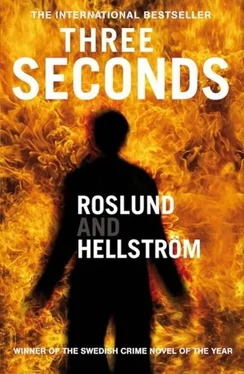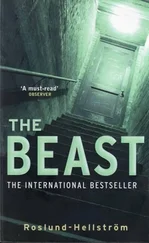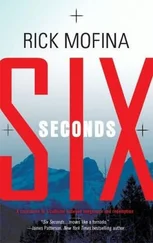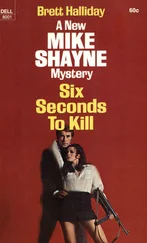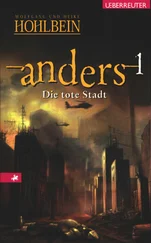"I really appreciate you asking, Erik. I realize that it's not really your job. But, yes, we have talked openly about this."
Erik Wilson had asked the question. And got the answer he wanted to have.
"In case anything should happen."
He changed his position on the uncomfortable plastic-covered sofa.
"If you're about to be exposed, you can't escape very far in a prison, but you can demand to be put in isolation."
Wilson looked at Paula, Piet.
"You might be given a death sentence. But you're not going to die. When you've asked to be put in isolation, once you have that protection, contact us and wait for a week. That's the time we'll need to get the papers sorted for someone to come and get you out."
He opened the black briefcase that was standing by his feet and put two folders on the coffee table between them. A new section from the Swedish National Police Board's criminal records and an equally new interrogation transcript which was now included in the documentation of a ten-year-old preliminary investigation.
INTERROGATING OFFICER JAN ZANDER (JO): A nine millimeter Radom. PIET HOFFMANN (PH): Right.
RD: When you were arrested. Recently fired. Two bullets were missing from the magazine.
PH: If you say so.
Piet Hoffmann read through the amended documents in silence.
"Five years."
"Yes."
"Attempted murder? Aggravated assault on an officer?"
"Yes."
IO: Two shots. Several witnesses confirm it.
PH: (silence)
IC): Several witnesses in the block of flats on Kaptensgatan in Söderhamn whose windows face the lawn where you fired two shots at Constable Dahl.
PH: Söderhamn? There, I've never been there.
Erik Wilson had worked with each little piece in detail so that, all together, it would add up to a credible and tenable background.
"Does it- Do you think it'll work?"
Any change to a judgment in a criminal record always required a new hearing for the investigation that had once taken place, and new entries in the Prison and Probation Service files from the prison where the sentence was served, according to the changes.
"It works."
"According to the judgment and preliminary investigation records, you hit a police officer in the face three times with a loaded Radom pistol and didn't stop until he fell unconscious to the ground."
IO: You tried to kill a police officer on duty. One of my colleagues. I want to
know why the hell you did that?
PH: Is that a question?
IO: I want to know why!
PH: I never shot at a policeman in Söderhamn. Because I never went to
Söderhamn. But if I had been there and if I had shot at your colleague it
would have been because I don't particularly like the police.
"You then turned the gun, cocked it, and fired two shots. One hit him in the thigh. The other in the left upper arm."
Wilson leaned back against the plastic.
"No one who looks at your background and has access to parts of your criminal record or the preliminary investigation will be in any doubt. I also added a note farther down about handcuffs. You were in handcuffs the whole time you were being questioned. For security reasons."
"That's good."
Piet Hoffmann folded together the two pieces of paper.
"Give me a couple of minutes. I just want to go through them once more. Then I'll know it."
He held the court judgment that had never been pronounced and the hearing that had never taken place, but still were his most important tools for carrying out his role in the prison corridors.
Thirty-one hours left.

The bells in both towers of Höglid church struck the hour after midnight as he left Erik Wilson and number two via the communal gardens and an entrance on Heleneborgsgatan. it was still unusually warm outside, whether it was the spring turning to summer or the kind of warmth that comes from inside when the body is tense. Piet Hoffmann took off his jacket and walked toward Bergsunds Strand and his car that was parked close enough to the water's edge for the headlights to illuminate the dark water when he started the engine. He drove from west to east Si5dermalm and the night, which should have been thronging with people who had longed for the warmth all winter and now didn't want to go home, was empty, the noisy town had fallen to rest. He accelerated after Slussen, along Stadsgardskajen, then braked and turned off just before Danvikstull bridge and the municipal boundary with Nacka. Down Tegelviksgatan and then left into Alsni5gatan to the barrier that blocked the only road up to Danviksberget.
He got out into the dark and jangled his keys until he found the piece of metal that was about half the size of a normal key; he'd carried it with him for a while now; they'd met fairly frequently in recent years. He opened and closed the barrier and drove slowly along the winding road up the hill to the outdoor café at the top that had been serving cinnamon buns with a view of the capital for decades now.
He stopped the car in a deserted lot and listened to the surf by the cliffs where the sea flowed into Saltsjon. A few hours earlier, customers would have sat here, holding hands while they talked or yearned or just drank their café lattes in the kind of silence that is shared. A forgotten coffee cup on a bench, a couple of plastic trays with crumpled napkins on another. He sat down by the building with its closed wooden shutters and a table chained to a lump of gray concrete. Piet Hoffmann looked out over the city where he had lived for the greater part of his life, but he still felt like a stranger, someone who was just visiting for a while and would soon move on, wherever it was he was actually going.
He heard footsteps.
Somewhere in the blackness behind him.
At first faint and far away, feet against a hard surface, then closer and clearer, gravel that loudly proclaimed how much the person walking on it was trying not to be heard.
"Pier."
"Lorentz."
A dark, solid man of his own age.
They embraced each other as usual.
"How much?"
The dark, solid man sat down in front of him, elbows heavy on the table which dipped slightly. They had known each other for exactly ten years. One of the few people he trusted.
"Ten kilos."
They had done time together at Österåker. Same unit, neighboring cells. Two men who became close in a way that they would never have done if they'd met anywhere else but there, cooped up and without much choice, they had become best friends, without realising it at the time.
"Strength?"
"Thirty?"
"Factory?"
"Siedlce."
"Blossom. That's good. It's what they want. And I don't need to bullshit about the quality. But personally, I can't stand the smell."
Lorentz was the only name he would never give to Erik. He liked him. He needed him. Lorentz sold on what Piet had cut, to earn some money for himself.
"But thirty percent… too strong for Plattan and Centralen. No one there should have anything stronger than fifteen, otherwise there's just trouble. This- I'll sell it in the clubs, the kids want it strong and have the money to pay."
Erik had realized that there was someone whose name he was not going to get. And why. So Piet could continue to earn money from his own business and Erik and his colleagues turned a blind eye and sometimes even facilitated it, in exchange for continued infiltration.
"Ten kilos of thirty percent gear is a fuck of a lot. I'll take it, obviously. Like I always do when you ask. But-and now I'm talking to you as a friend, Piet-are you sure that you've got everything under control if anyone starts to ask questions?"
They looked at each other. The supposed question could be interpreted as something else. Distrust. Provocation. It wasn't. Lorentz meant exactly what he said and Pier knew that he was asking because he was concerned. Before, what he'd done was to cut a little more of the supplies that he got from somewhere to sell on somewhere else, for his own purposes. But this time he needed big money and for other reasons, so some of the vacuum-packed tins of uncut gear had been moved from the fan heater shaft to an IKEA bag only a few hours after Henryk's visit.
Читать дальше
